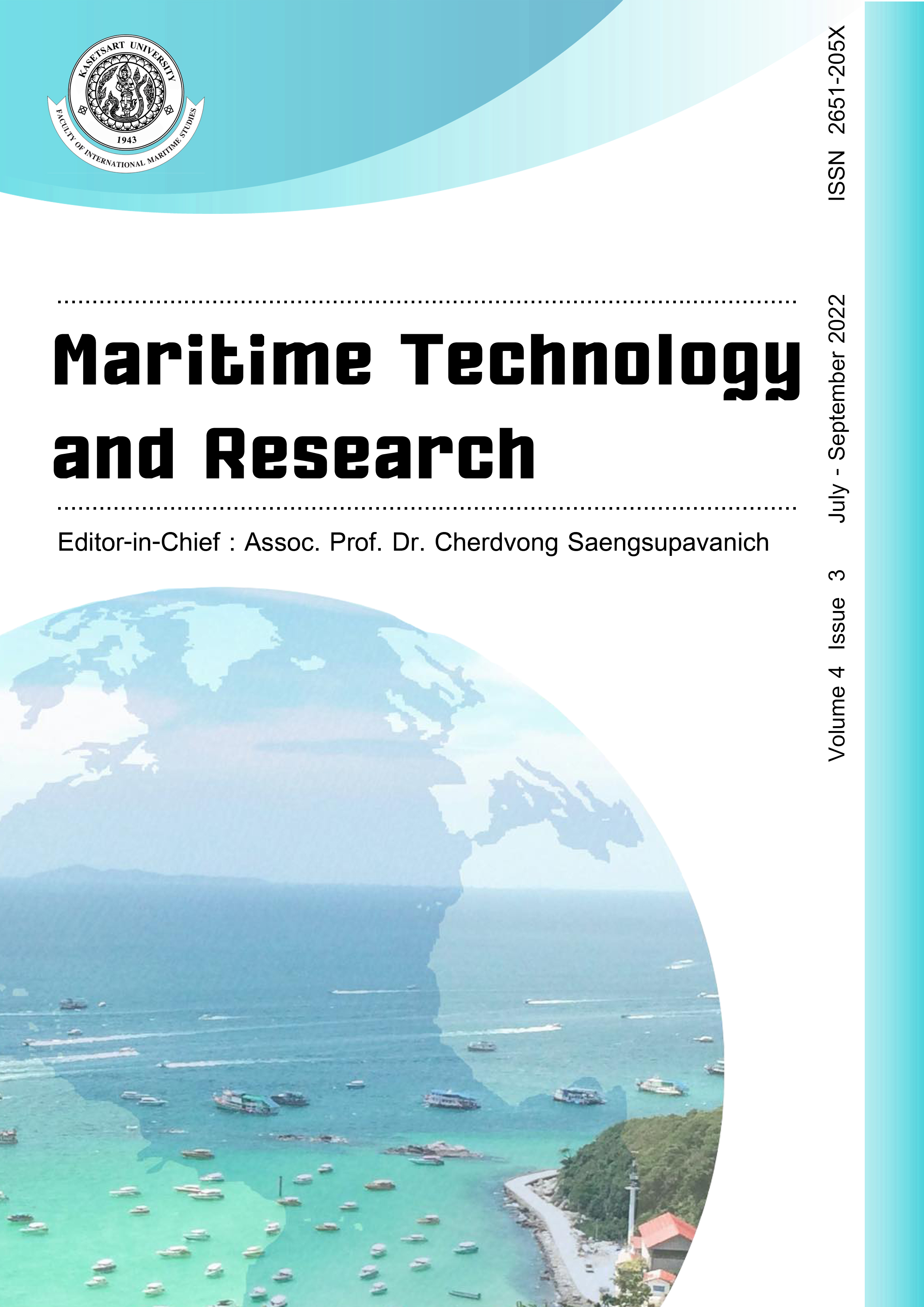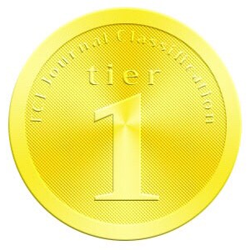The port of Gothenburg under the influence of the fourth stage of the industrial revolution: Implementing a wide portfolio of digital tools to optimize the conduct of operations
DOI:
https://doi.org/10.33175/mtr.2022.253844Keywords:
Digitalization, Port of Gothenburg, Optimization of operations, Supply chain, United Nations sustainable development goalsAbstract
Taking advantage of the benefits associated with the fourth stage of the industrial revolution- quite often termed as the “era of digitalization” in the wider literature- has become a main priority for ports globally, as part of their further development. The implications of smart technologies on the sustainable development of these ports have not been adequately addressed by the existing literature, and it is exactly this gap that this study aims to fill. This paper aims to provide an overview of the innovative technologies adopted by a small number of smart ports around the world and highlight their links to sustainable development by employing an exploratory review of various sources. The design features of the smart ports identified by the existing literature have formed the basis for the development of a conceptual framework used in this paper for the analysis of the case of the Port of Gothenburg- the largest Scandinavian port, both in terms of number of visits and volume of cargo handled. The specific port is currently expanding its digital transformation by launching a platform during the second half of 2021 that will link digitally and coordinate the operations of all relevant stakeholders- shipping companies, freight forwarders, rail operators- in the port area. From the analysis, it becomes clear that the implementation of a wide portfolio of digital initiatives by the port under discussion has already resulted in the optimization of its operations and is strongly interrelated to its sustainable development. Important issues to be addressed in the near future that are identified by this research effort include necessary cultural adaptation and training activities to ensure the correct exploitation of these tools by the whole pool of the workforce.
------------------------------------------------------------------------------
Cite this article: Dalaklis, D., Christodoulou, A., Ölcer, A.I., Ballini, F., Dalaklis, A., Lagdami, K. (2022). The port of Gothenburg under the influence of the fourth stage of the industrial revolution: Implementing a wide portfolio of digital tools to optimize the conduct of operations. Maritime Technology and Research, 4(3), 253844. https://doi.org/10.33175/mtr.2022.253844
------------------------------------------------------------------------------
References
Acciaro, M., Renken, K., & El Khadiri, N. (2020). Technological change and logistics development in European ports (pp. 73-88). In Carpenter, A., & Lozano, R. (Eds). European Port Cities in Transition. Strategies for Sustainability. Springer, Cham. https://doi.org/10.1007/978-3-030-36464-9_5
Alamoush, A., Ballini, F., & Dalaklis, D. (2021). Port supply chain management framework: Contribution to the United Nations’ sustainable development goals, Maritime Technology and Research, 3(2), 137-161. https://doi.org/10.33175/mtr.2021.247076
APM Terminals Gothenburg. (2021). The Gothenburg gateway: A shorter distance to world markets benefits all of Sweden. Retrieved from file:///C:/Users/ac/AppData/Local/Temp/gothenburg-gateway-eng-final.pdf
Bessid, S., Zouari, A., Frikha A., & Benabdelhafid, A. (2020). Smart ports design features analysis: A systematic literature review. In Proceedings of the 13ème Conférence Francophone de Modélisation, Optimisation et Simulation, Agadir, Morocco.
Cambridge English Dictionary. (2021). Data. Retrieved from https://dictionary.cambridge.org/dictionary/english/data
Christodoulou, A. (2020). Maritime environmental performance indices: Useful tools for evaluating transport supplier environmental performance? WIT Transactions on The Built Environment, 187, 187-198. https://doi.org/10.2495/MT190171
Christodoulou, A., & Cullinane, K. (2019). Identifying the main opportunities and challenges from the implementation of a port energy management system: A SWOT/PESTLE analysis. Sustainability, 11(21), 6046. https://doi.org/10.3390/su11216046
Christodoulou, A., & Cullinane, K. (2020). Potential for, and drivers of, private voluntary initiatives for the decarbonisation of short sea shipping: evidence from a Swedish ferry line. Maritime Economics & Logistics, 23, 632-654. https://doi.org/10.1057/s41278-020-00160-9
Christodoulou, A., & Kappelin, H. (2020). Determinant factors for the development of maritime supply chains: The case of the Swedish forest industry. Case Studies on Transport Policy, 8(3), 711-720. https://doi.org/10.1016/j.cstp.2020.07.008
Christodoulou, A., Dalaklis, D., Ölçer, A. I., & Ballini, F. (2021). Linking digitalization to sustainable development: The case of the port of Gothenburg. In Proceedings of the International Maritime Transport and Logistics Conference, Arab Academy for Science, Technology and Maritime Transport. https://doi.org/10.13140/RG.2.2.12419.22564
Christodoulou, A., Pastra, A., Doelle, M., & Johansson, T. (2021). Four spheres of influence: The critical role of ports in global decarbonization effort. In Chircop, A., Coffen-Smout, S., & McConnell, M. (Eds.). Ocean Yearbook 35, Brill Academic Publishers.
Corbett, J. J., Winebrake, J. J., Green, E. H., Kasibhatla, P., Eyring, V., & Lauer, A. (2007). Mortality from ship emissions: A global assessment. Environmental Science & Technology, 41(24), 8512-8518. https://doi.org/10.1021/es071686z
Culturedigitally. (2021). Digitalization and Digitization. Retrieved from https://culturedigitally.org/2014/09/digitalization-and-digitization
Dalaklis, D. (2018). Exploring the issue of technology trends in the “Era of digitalization”. In Proceedings of the World Maritime Day Parallel Event, Szczecin, Poland. https://doi.org/10.13140/RG.2.2.18767.79524
Dalaklis, D. (2020). Unleashing the power of data to optimize vessel performance. In Proceedings of the Vessel Optimization Webinar Week. London, UK. https://doi.org/10.13140/RG.2.2.16851.40489
Dalaklis, D., Fonseca, T., & Schröder-Hinrichs J. U. (2019). How will automation and digitalization impact the future of work in cargo transport and handling? The ITF/WMU Transport 2040 Report. In Proceedings of the International Cargo Handling Coordination Association, Valetta-Malta. https://doi.org/10.13140/RG.2.2.18537.44644
Dalaklis, D., Katsoulis, G., Kitada, M., Schröder-Hinrichs, J. U., & Ölcer, A. I. (2020). A “Net-Centric” conduct of navigation and ship management. Maritime Technology and Research, 2(2), 2, 90-107. https://doi.org/10.33175/mtr.2020.227028
Duru, O. (2010). Theory of shipping productivity revisited: Industrial revolution, ship technology and shipping freight rates. Retrieved from https://jshet.net/docs/conference/74th/duru.pdf
Gartner. (2021). Definition of Digitalization. Retrieved from https://www.gartner.com/en/information-technology/glossary/digitalization
Goyal, D. R., Rekka, G., Malik, S., & Tyagi, A. K. (2020). Emerging trends and challenges in data science and big data analytics (pp. 1-8). In Proceedings of the 2020 International Conference on Emerging Trends in Information Technology and Engineering, Vellore, India.
International Maritime Organization. (2018). Initial IMO strategy on reduction of GHG emissions from ships. Resolution MEPC.304(72), London, UK.
Johansson, T. M., Dalaklis, D., & Pastra, A. (2021). Maritime robotics and autonomous systems operations: Exploring pathways for overcoming international techno-regulatory data barriers. Journal of Marine Science and Engineering, 9(6), 594. https://doi.org/10.3390/jmse9060594
Johansson, T., Long, R., & Dalaklis, D. (2019). The role of WMU-Sasakawa global ocean institute in the era of big data. The Journal of Ocean Technology, 14(4), 22-29. http://dx.doi.org/10.13140/RG.2.2.31179.13605
Jović, M., Kavran, N., Aksentijević, S., & Tijan, E. (2019). The transition of Croatian seaports into smart ports (pp. 1386-1390). In Proceedings of the 42nd International Convention on Information and Communication Technology, Electronics and Microelectronics, Opatija, Croatia. https://doi.org/10.23919/MIPRO.2019.8757111
Karas, A. (2020). Smart port as a key to the future development of modern ports. The International Journal on Marine Navigation and Safety of Sea Transportation, 14(1), 27-31. https://doi.org/10.12716/1001.14.01.01
Lind, M., Watson, R. T., Ward, R., Bergmann, M., Bjørn-Andersen, N., Rosemann, M., Haraldson, S., & Andersen, T. (2018). Digital data sharing: The ignored opportunity for making global maritime transport chains more efficient. Retrieved from https://unctad.org/news/digital-data-sharing-ignored-opportunity-making-global-maritime-transport-chains-more
Martjin, N., Hulstjin, J., De Bruijne, M., & Yao-Hua, T. (2015). Determining the effects of data governance on the performance and compliance of enterprises in the logistics and retail sector (pp. 454-466). In Proceedings of the 14th IFIP Conference on e-Business, e-Services, and e-Society, Delft, Netherlands.
Medium. (2021). Digitization, Digitalization, and Digital Transformation: What’s the Difference? Retrieved from https://medium.com/@colleenchapco/digitization-digitalization-and-digital-transformation-whats-the-difference-eff1d002fbdf
Molavi, A., Lim, G. L., & Race, B. (2020). A framework for building a smart port and smart port index. International Journal of Sustainable Transportation, 14(9), 686-700. https://doi.org/10.1080/15568318.2019.1610919
Ölçer, A. I., Kitada M., Dalaklis, D., & Ballini, F. (2018). Trends and challenges in maritime energy management. WMU Studies in Maritime Affairs, Springer, Cham.
Port of Gothenburg. (2021). APM terminals Gothenburg. Retrieved from https://www.apmterminals.com/en/gothenburg
Port of Gothenburg. (2021). Digital transformation set to produce Port of Gothenburg 2.0. Retrieved from https://www.portofgothenburg.com/news-room/press-releases/digital-transformation-set-to-produce-port-of-gothenburg-2.0
Port of Gothenburg. (2021). Unique digital solution makes the port of Gothenburg smarter. Retrieved from https://www.mynewsdesk.com/goteborgs_hamn/pressreleases/unique-digital-solution-makes-the-port-of-gothenburg-smarter-2943889
Poulsen, R.Y., & Sampson, H. (2019). “Swinging on the anchor”: The difficulties in achieving greenhouse gas abatement in shipping via virtual arrival. Transportation Research Part D: Transport and Environment, 73, 230-244. https://doi.org/10.1016/j.trd.2019.07.007
Sanchez-Gonzalez, P. L., Díaz-Gutiérrez, D., Leo, T. J., & Núñez-Rivas, L. R. (2019). Toward digitalization of maritime transport? Sensors, 19(4), 926. https://doi.org/10.3390/s19040926
Styhre, L., Winnes, H., Black, J., Lee, J., & Le-Griffin, H. (2017). Greenhouse gas emissions from ships in ports: Case studies in four continents. Transportation Research Part D: Transport and Environment, 54, 212-224. https://doi.org/10.1016/j.trd.2017.04.033
UNFCCC. (2015). Paris agreement. In Proceedings of the 21st Conference of Parties. Paris, France.
Winnes, H., Styhre, L., & Fridell, E. (2015). Reducing GHG emissions from ships in port areas. Research in Transportation Business & Management, 17, 73-82. https://doi.org/10.1016/j.rtbm.2015.10.008
World Maritime University. (2019). Transport 2040: Automation, technology, employment - The future of work. Retrieved from https://commons.wmu.se/lib_reports/58
World Ports Sustainability Program. (2020). World ports sustainability report. Retrieved from https://sustainableworldports.org/wp-content/uploads/WORLD-PORTS-SUSTAINABILITY-REPORT-2020-FIN.pdf
Yang, Y., Xue, X., Gao, Y., Zhang, H., & Du, X. (2020). Constructing sustainable coastal ecological environment: A hierarchical structure for sustainable smart ports. Journal of Coastal Research, 99, 358-363. https://doi.org/10.2112/SI99-049.1
Yang, Y., Zhong, M., Yao, H., Yu, F., Fu, X., & Postolache, O. (2018). Internet of things for smart ports: Technologies and challenges. IEEE Instrumentation & Measurement Magazine, 21(1), 34-43. https://doi.org/10.1109/MIM.2018.8278808
Yap, W. Y., & Lam, J. S. L. (2013). 80 million-twenty-foot-equivalent-unit container port? Sustainability issues in port and coastal development. Ocean & Coastal Management, 71, 13-25. https://doi.org/10.1016/j.ocecoaman.2012.10.011
Yau, K. A., Peng, S., Qadir, J., Low, Y., & Ling, M. H. (2020). Towards smart port infrastructures: Enhancing port activities using information and communications technology. IEEE Access, 8, 83387-83404. https://doi.org/10.1109/ACCESS.2020.2990961
Zins, C. (2021). What is the meaning of “Data”, “Information”, and “Knowledge”? Retrieved from https://pciucr.files.wordpress.com/2011/03/what-is-the-meaning-of-data.pdf
Downloads
Published
Issue
Section
License
Copyright (c) 2021 Maritime Technology and Research

This work is licensed under a Creative Commons Attribution-NonCommercial-NoDerivatives 4.0 International License.
Copyright: CC BY-NC-ND 4.0








